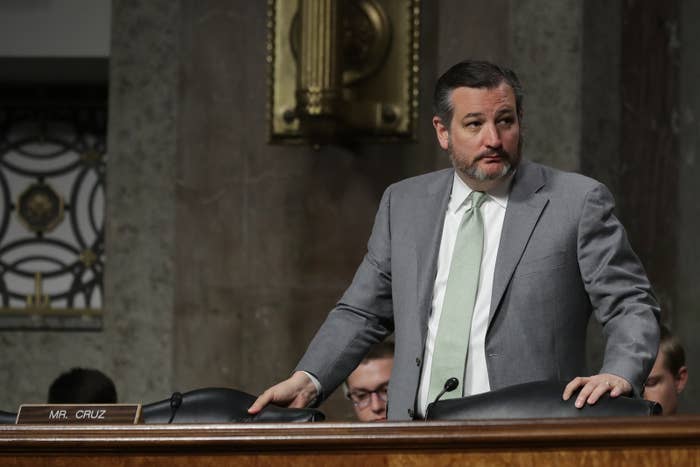
WASHINGTON — Sen. Ted Cruz is suing the Federal Election Commission over rules that limit how much money he can reimburse himself for his 2018 race against Democrat Beto O’Rourke. Cruz put $260,000 of his own money into his successful Senate reelection campaign and is now fighting a law that says his campaign can only raise up to $250,000 to reimburse him.
In a lawsuit filed Monday in federal court in Washington, DC, Cruz is arguing that the $250,000 cap on postelection fundraising to repay candidates for personal loans violates the First Amendment. The Texas Republican contends that the restrictions undercut the rights of candidates and donors to express themselves by financing political speech.
“The First Amendment commands that ‘Congress shall make no law ... abridging
the freedom of speech.’ This bedrock liberty was designed to ensure the full and free political debate that is the hallmark of our democratic form of government,” Cruz’s lawsuit begins. “At its core, it protects the rights of citizens to engage in political speech.”
The section of the Bipartisan Campaign Reform Act that Cruz is challenging is known as one of the so-called millionaire provisions of the law — rules aimed at limiting the advantages of wealthy candidates in an election cycle. It says that campaigns cannot use more than $250,000 in funds raised after an election to repay a candidate for personal loans to their campaign.
At midnight on Election Day, Cruz’s campaign committee had about $2.2 million available, and owed nearly $2.5 million in debts, according to his lawsuit. The campaign prioritized using the money it already had to “pay vendors and meet other obligations” instead of reimbursing Cruz for the money he’d put up himself.
The lawsuit doesn’t specify how much money Cruz’s campaign has raised since the election, but it does say that the campaign committee repaid $250,000 — the legal limit — of the $255,000 loan that Cruz secured. That means the campaign still owes $5,000 for that loan, plus the $5,000 that Cruz personally loaned, for a total of $10,000.
In the complaint, Cruz notes that the US Supreme Court has repeatedly struck down campaign finance laws that limit the amount of money flowing into the political arena, including the Citizens United v. FEC decision in 2010, which held that political contributions are First Amendment–protected speech and that corporations and unions can’t be blocked from donating. Cruz also pointed to a 2008 decision, Davis v. FEC, which struck down a section of the BCRA, also known as the McCain–Feingold Act. That section, known as the “millionaire’s amendment,” raised contribution limits for a candidate in certain circumstances if his or her opponent put up more than $350,000 in personal funds.
Cruz is represented by a prominent conservative attorney in Washington, Charles Cooper of the law firm Cooper & Kirk. Cruz worked for Cooper’s firm early in his career, and Cooper has long supported Cruz’s political ambitions, donating thousands of dollars to Cruz’s Senate campaign as well as to his presidential run in 2016, according to FEC records. Cooper has long been a go-to lawyer on the right on a variety of issues — he was former attorney general Jeff Sessions’ personal lawyer in connection with the Russia investigation — including challenges to campaign finance restrictions.
Catherine Frazier, a spokesperson for Cruz's campaign, said in a statement to BuzzFeed News that the campaign finance law at issue only served "career politicians at the expense of the First Amendment."
"The Supreme Court has repeatedly struck down restrictions like this as unconstitutional restrictions on free speech, and we are confident the federal courts will do so here as well," Frazier said.
A spokesperson for the Federal Election Commission declined to comment, citing the pending litigation.
UPDATE
Updated with comment from a Cruz campaign spokesperson.

